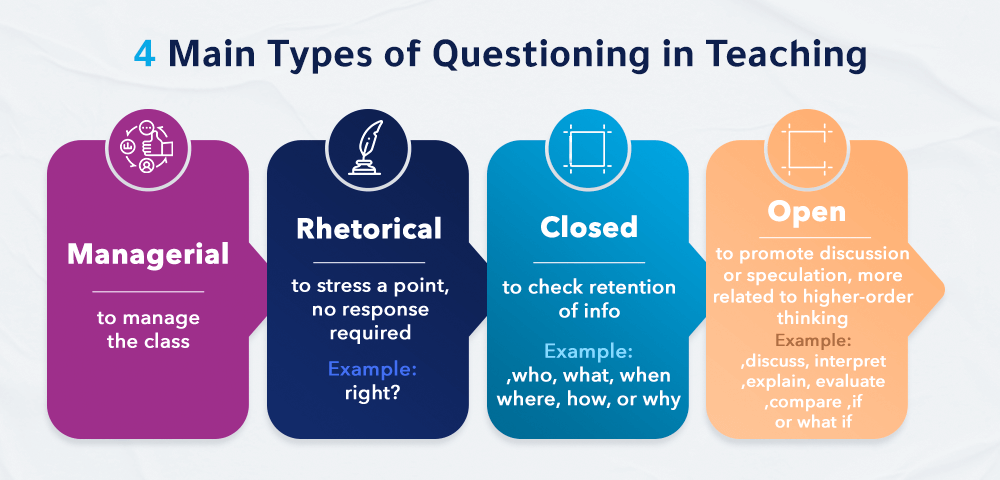The importance of probing questions in teaching… Trying to come up with ideas for smart, thought-provoking probing questions is never easy. Actually asking them, in time, specifying a certain time for them, and designing a creative strategy for them is a whole other dilemma and amazing teaching skills.
As the world is changing, new elements have come to live in teaching including asking probing questions. Teachers have been forced to be introduced to new techniques in teaching especially with the overwhelming of the new methods in learning. They have sought to change their habits. According to Dylan William: “In improving as teachers, we are not collecting tools, we are seeking to change our habits, the things we do automatically every day.”
Table of Contents
4 Types of Questioning in Teaching
What is probing questions in teaching? To find out what is probing technique, let’s first get introduced to all the different types of probing questions. At least 11 systems were formed for classifying questions in teaching. How to Ask the Right Questions, by Edition by Patricia E. Blosser, sums up the major types of questions teachers usually ask in class and categorizes them in the following:

What Are Some Types of Probing Questions?
It is a teaching method that helps students explain their ideas freely and enhances the group discussions within the classroom. Critical thinking can be easily built through asking probing questions. With its fruitful outcome of new knowledge, probing questions technique can be composed of questions and answers that challenge assumptions and reveal many contradictions.
What Are the Types of Probing Questions?
1. Repetition: The same question can be repeated or rephrased with the purpose of getting more detail about the topic. Echo questions can be used to emphasize on the area you want more detail.
2. Extension: If you did not get enough information from either the student or the teacher.
3. Evaluation: To test how students can judge and evaluate the topic.
4. Emotional: It can be in the form of a question like “How do you feel about this topic?”
5. Clarification: Questions and answers can be vague. Thus, probing questions can be used for clarification.
6. Purpose: Sometimes the purpose of what people say is not clear. Probing questions such as “Why did you mention this fact?” can reveal more the purpose of discussion.
7. Relevance: Sometimes the listener gets confused about what people say and questions the relevance of what people say to the topic of discussion.
8. Completeness and Accuracy: Such questions can be asked to get more detail and accuracy about the topic.
If you’ve ever wondered about how to grade essay questions using a reliable computer-assessment system, here’s how.
What is the purpose of asking probing questions?
Probing questions are one of the contemporary teaching techniques that support the educational direction of activating students’ positive participation in the educational process and developing it as a two-way process between educators and learners.
The purpose of probing questions is to find out more details about a topic to determine the extent to which learners understand it.
Through these questions, the educator can identify the thoughts of his students and find out what they think about the topics he is presenting to them.
This method encourages learners to interact in the classrooms and to reflect on past knowledge stored in their memory and link it to the new knowledge they are being taught.
The probing questions help sharpen critical thinking skills in a way that deepens knowledge acquisition and also contributes to the accumulation of cognitive experiences in the minds of the students.
In order for the educator to achieve the purpose of probing questions, he/she must ensure the asked questions allow space for in-depth discussion to be opened up to as many students as possible in the classroom.
The Techniques Teachers Follow to Use Probing Questions
There are 7 probing techniques that should be considered while conducting probing questions, which are the following:
- Teachers have to prepare a certain topic and decide the setting of the discussion.
- Putting some predictions on how the students will react.
- Preparing a model explanation along with the critical thinking process.
- Teachers have to identify possible misconceptions and misunderstanding of communication.
- Monitoring students as they discuss their ideas and evaluate them accordingly.
- Selecting students to share their thinking, dividing them into groups or pairs to build more connections.
- Identify follow up questions to open further explanations and thinking.
Why Are Probing Questions Important?
- Probing questions help students acquire new knowledge.
- They make thinking visible and therefore pave the way for critical thinking.
Dr. Adel Ayed has highlighted the importance of probing questions in teaching in his article as he has mentioned: “Probing questions depends on leading students gradually to the correct answer, and to the interpretation and critique of each answer to make it easier for the student to correct his/her mistakes and reach the correct generalization.”

So what is the importance of questioning in teaching?
- Probing questions can be used after a presentation to know how well your students get the topic of discussion and to get a deeper insight of their thinking process.
- Students as well can use probing questions to ensure that they have full understanding of the entire topic of discussion.
- Such questions also promote the spirit of cooperation within the classroom as students work in pairs or groups listening to each other’s questions and answers (get to know all the answers to your questions on computer-based exams).
How Can Teachers Use Probing Questions Technique Successfully?
- Teachers should be passionate about their topic of discussion so that students can get engaged successfully.
- Topics selected should be interesting and have enough information that can open a way for such probing questions.
- Teachers have to create a sense of energy in the classroom and involve everyone in the discussion.
- Discipline inside the classroom is very important to keep the students focused on the questioning.
- Instructors can divide the students into groups or pairs. They can also take small white boards to write their answers on and then discuss each answer individually.
- There should be a preparation plan that includes a toolbox of questions.
How Teaching Experts Use Probing Questions?
- Probing questions has contributed in enhancing the classroom management such as securing students’ attention, eye front, and attentive listening.
- The classroom dialogue is conducted with energy and passion. Actually, probing questions can bring students from the back and the corners into the fray.
- John Sayers has mentioned in his Geography blog the importance of probing questions in teaching saying: “I love questioning and the potential depth to thinking it can generate. However, far too often including in my own practice, I prevent opportunities for taking the thinking deeper by posing a new challenge, problem to keep that engaging thrust of something new flowing in the room.”
Examples of Probing Questions That You Can Use
- Can you explain how you managed to do it?
- Can you give me examples on how this might happen?
- Is that always true?
- Do you agree with your colleague’s answer?
- Can you give me a situation where you used that strength?
To sum up, teachers should abandon their traditional ways of teaching and start to cope with the challenges of the current age. New teaching techniques including probing can improve the class management and students’ engagement effectively.
To know more Qorrect, the comprehensive assessment system, please press here.
Resources:
- https://journals.sagepub.com/doi/pdf/10.3102/00346543040005707
- https://citl.illinois.edu/citl-101/teaching-learning/resources/teaching-strategies/questioning-strategies
- https://www.getmygrades.co.uk/probing-strategy-using-questions-to-develop-student-answers/
- https://education.nsw.gov.au/teaching-and-learning/professional-learning/teacher-quality-and-accreditation/strong-start-great-teachers/refining-practice/teacher-questioning/key-questioning-strategies
 Qorrect Blog
Qorrect Blog






